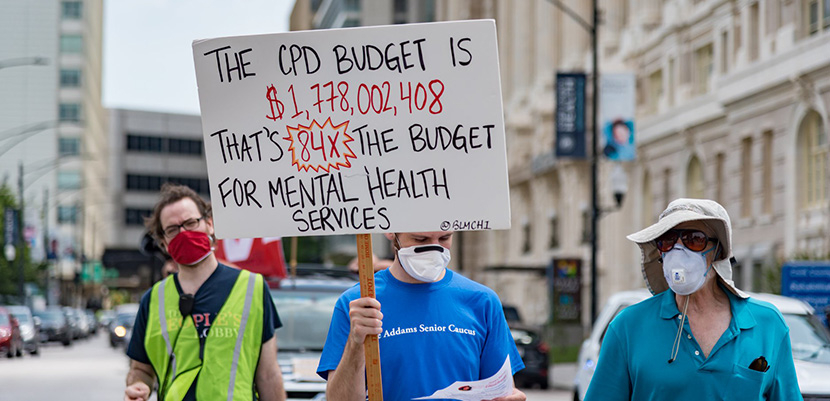Letters to the Editor: Issue 497

Nurses, teachers, and other unions and community organizations marched through the University of Illinois at Chicago Medical District June 27 to demand that funds be redirected away from police and toward services that improve health. Photo: Sarah Ji / Love and Struggle Photos.
Unions Need To Reckon with Their Own Histories
On June 9 the General Board of the AFL-CIO adopted a “comprehensive set of recommendations ... to address America’s long history of racism and police violence against black people."
These recommendations illustrate how far the U.S. union movement has to go to meet Bianca Cunningham's call in the July issue "to acknowledge its past faults, articulate a vision of true social and economic equity, and exercise our power as labor.” The most noteworthy thing about them is that this is what passes for “comprehensive” in the top ranks of the AFL-CIO.
The AFL-CIO Board did call for the immediate resignations of the Secretary of Defense, the chairman of the Joint Chiefs of Staff, and the president of the police union in Minneapolis; supported the Seattle-area central labor council in its demands for reform inside police unions; and called for police and criminal justice reform.
They supported a “crackdown on police brutality while protecting the due process rights of all public service workers.” However, they “respectfully” rejected the call for the AFL-CIO to cut ties with the International Union of Police Associations.
Additionally, AFL-CIO President Richard Trumka announced a plan to convene a meeting of the affiliate unions that have law enforcement units to discuss a “code of excellence” to create systemic change from within organized labor, including a monitoring and enforcement mechanism.
WHAT'S MISSING
Two things are glaringly lacking from the Board's recommendations. First, a call for unions to join the movement in the streets. Second, any commitment to examine ways in which AFL-CIO affiliates themselves have benefited from—or helped to sustain—racist policies and practices.
Some unions are rightly proud of their fights against racist hiring practices in the 1930s, '40s and '50s. But other unions resisted open employment and kept their apprenticeship programs closed to Black and Brown workers. Some unions provided key support to the civil rights movement of the 1960s. Most did not.
Many put what they narrowly perceived as the interests of their members ahead of a concern for the interests of the broader working class, enthusiastically supporting “tough on crime” candidates like Rudolph Giuliani and embracing the building and staffing of prisons as jobs programs.

SUPPORT LABOR NOTES
BECOME A MONTHLY DONOR
Give $10 a month or more and get our "Fight the Boss, Build the Union" T-shirt.
The AFL-CIO must examine unions' own history of support for or opposition to full civil, political, and human rights for Black people.
The AFL-CIO should engage with historians of the labor movement and of the Black liberation movement, giving them access to unions' internal records and archives to document how unions' practices aided or hindered the advance of equal rights and equal opportunities. Members and retirees should be involved, as well. They must look at both overt demonstrations of support for or opposition to equality, and the more covert functioning of apprenticeship programs and seniority systems.
They should also examine unions' internal functioning. Some unions maintained segregated locals into the 1960s. Some have election rules that favor incumbents so greatly that it is almost impossible for challengers who might more closely represent the interests of the majority of members to break the hold of white, male officers who have been in office for decades.
Unions need to take a hard look at their contribution to "America's long history of racism.” What has been the cost of that contribution? And what must unions do to repair some of the damage they have done?
Steve Downs
TWU Local 100 (retired)
Hastings on Hudson, New York
Police Unions Are Like Cartels
Your article on the debate about police “unions” and the labor movement (July) is important. I've argued for decades that police “unions” are more like cartels than labor unions.
The police role in strikes and civil rights struggles is to do the dirty work of the bosses and rulers. It is why they originated as slave patrols, home of the Ku Klux Klan and other white terrorists in the South, and augmented the Pinkertons and other private armed goons against workers organizing and striking in the 1930s to the present.
Labor Notes coverage is great. I just renewed a two-year subscription.
Malik Miah
Teamsters, United Airlines (retired)
Windsor, California




